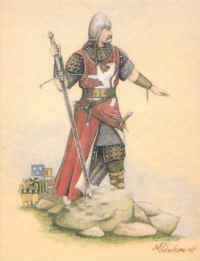 |
| (http://www.electricscotland.com/history/wallace.htm) 'Sir William Wallace' illustration by Murray Andrew Robertson. Limited Edition of 1000 prints each individually signed and numbered. Copyright Historic Illustration |
Imagine yourself standing in a crowd of people watching a punishment for treason being dealt. It is a cool autumn day, October 23rd, 1309 to be exact (Campbell). You are one of the few people in the crowd that really understands what is happening, you are one of the few Scottish soldiers dressed to blend in with the English commoners, and you aren't watching someone being punished for treason, you are watching a fellow soldier, your leader, your hero, your friend, being killed. He is hung to near death, disemboweled, and finally quartered, never once does he beg for mercy, the only sounds that come out of his mouth are yells of pain and the word, "Freedom" as he is killed. The remnants of his body are carried away and hung up at four of the bridges into England. You leave the crowd and head back to your home; you now realize that you, and your countrymen, have to win your independence without your nation's most valued leader, Sir William Wallace.
William was born in around 1270 near Ellerslie in Scotland. As a young lad, his uncle, a priest, trained him in swordsmanship and horsemanship, and taught him French and Latin. William Wallace grew to be six and a half feet tall in a time when infantrymen stood barely above five feet (Campbell). Then, in May of 1297, he killed William Heselrig, the English Sheriff of Lanark, also the man that killed Wallace's father; this is the accomplishment that sparked his legacy ("William). From that point on in his life, he was wanted "dead or alive" by the English.
Wallace joined the battle against England for Scotland's independence and became a deciding factor in the Scots' favor. In August of 1297, when Scotland was almost fully in Scottish hands, Wallace successfully recruited a band of commoners and small landowners to attack remaining English garrisons between the Rivers Forth and Tay. The Scottish, under Wallace's command, easily defeated the force by luring them across a narrow bridge, on which the English were picked off (Campbell). After freeing most of Scotland, William led Scottish forces into England to attack the main source. Upon returning from northern England in December of the same year, he was knighted and proclaimed guardian of the kingdom. In less than six years, William Wallace had risen from obscurity to become Sir William Wallace, holder of one of the most powerful posts in the kingdom. He was captured and killed on October 23rd, 1309 (Campbell).
Present day, Sir William Wallace is still remembered for his bravery, great leadership, and heroism. In the 19th century, statues commemorating him were put up overlooking the River Tweed and in Lanark. In 1869, a two hundred and twenty foot high National Wallace Monument was completed on a hill near Stirling, where the Scots fought their most decisive battles (Campbell). To this very day, people still think Wallace was a great hero. When Davey Kramer was asked whether or not he thought William Wallace was a hero, he answered, "Yes, he took a bunch of farmers and led them to take on the trained English army." When Ty Reiber was asked the same question, he had a similar answer, "Yes he led his people with heroic stature, and he was a hero." I can't help but agree with both of them, without William Wallace, Scotland would have been in major trouble, and to me, he fit the perfect build for a hero; brave, charismatic, smart, strong, and, most importantly, loyal. Even though he was killed, both Davey and Ty had to agree that Wallace's death only fired up the Scottish army and made them fight harder for their independence.
Once again imagine yourself in a crowd of English, watching Sir William Wallace's death, but this time realize that this man is not dying in vain. He is a Scottish national hero that has been a cornerstone in the fight for your independence. This great hero has led you fearlessly into many battles, and you have won. Even though Wallace is no longer going to physically going to be with you, he will always be with you in your memories, and will always remind you that you are fighting for one reason, freedom.
Page created on 8/27/2011 12:00:00 AM
Last edited 8/27/2011 12:00:00 AM
